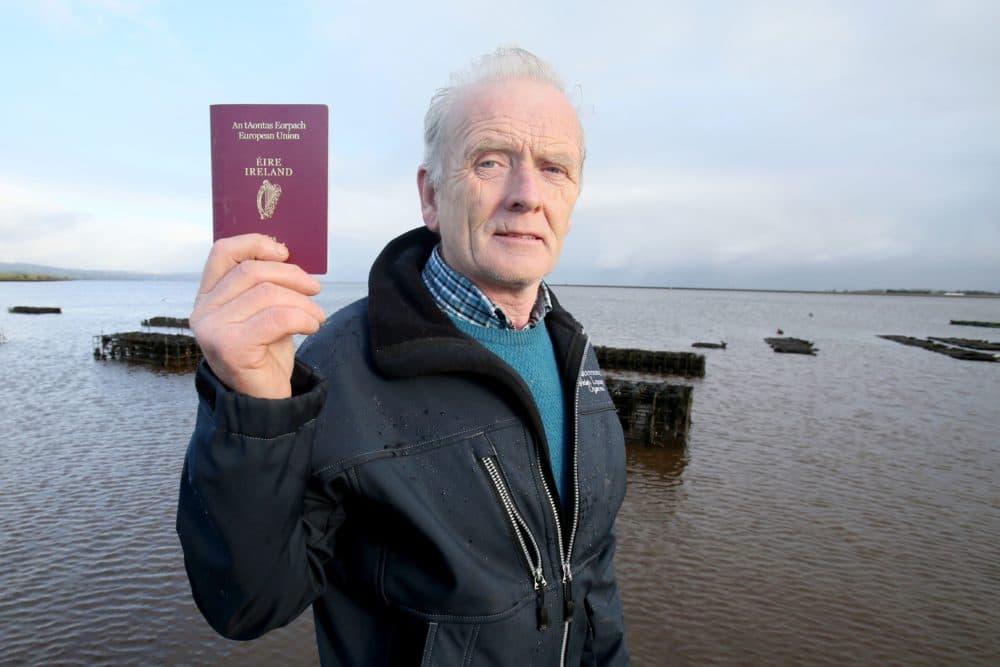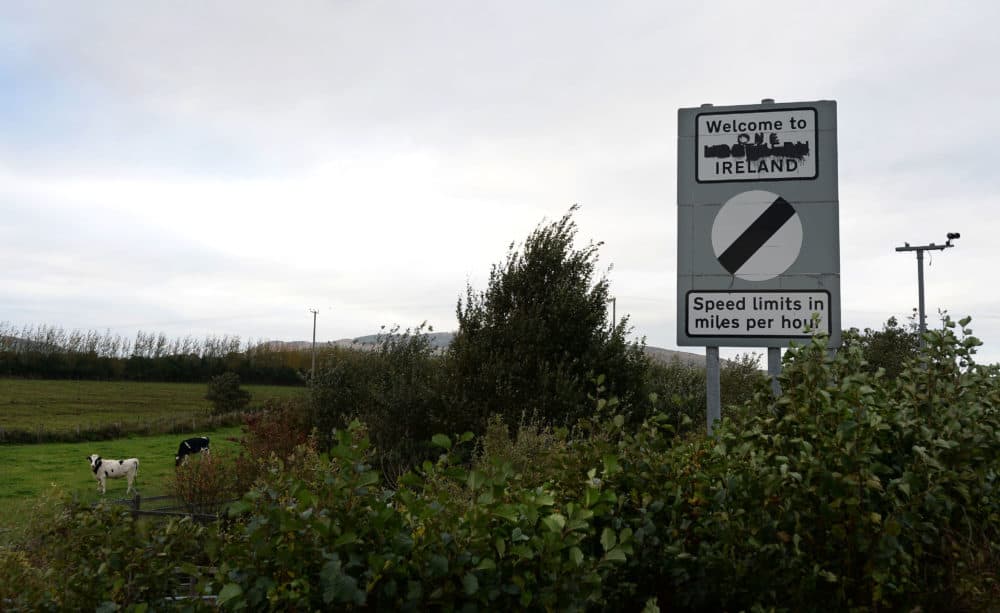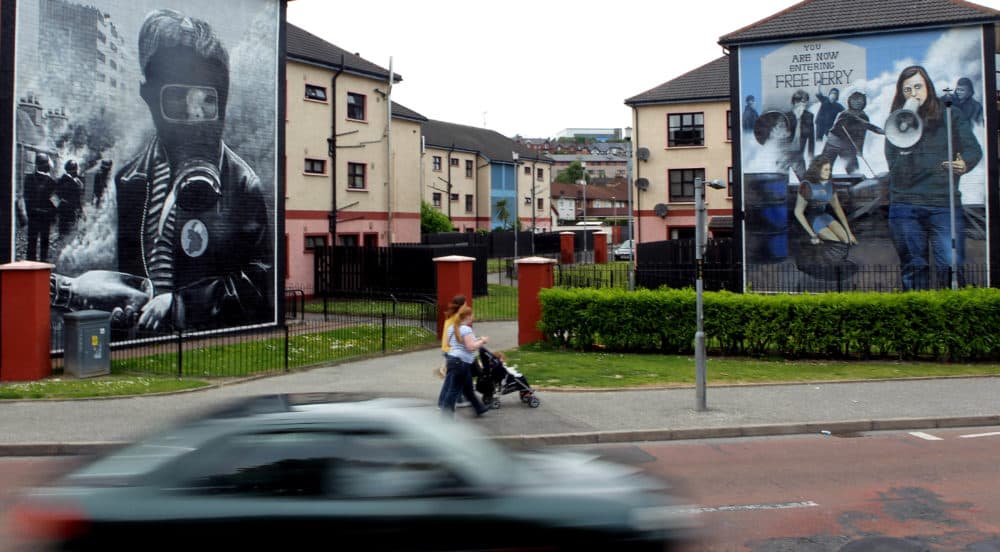Advertisement
Brexit: Before The Breakup
'Uncertainty' Looms As Northern Ireland Considers Future Beyond Brexit

LONDONDERRY, Northern Ireland — If you're looking for ground zero in the war over Brexit, William Lynch's oyster farm is a near-perfect example.
Lynch's business straddles two countries. He harvests oysters in Northern Ireland, which is a part of the United Kingdom. But his farm also extends into the Republic of Ireland, which will stay in the European Union after Brexit.
This year, he's hauled 90 tons of oysters from the picturesque mouth of the River Foyle, and shipped them off to France for processing and distribution.
"It is vital to my operation. I have to have free movement," says Lynch. "I'm in a real pickle."
That's because leaving Europe poses questions Lynch cannot find answers to: How does he move the oysters harvested in the Republic of Ireland just a few miles down the road into the U.K. where his company is based? What kind of tariffs would he pay? If there's a delay at a new border checkpoint, will his oysters spoil?
"Probably the quick solution for me would be to close down the operation in Northern Ireland and move it here to the Republic of Ireland. That would be my backstop," he says. "I don't want to do it."
Negotiators Promise No 'Hard' Border
Lynch is a poster boy for an as-of-yet intractable problem.
This week, Prime Minister Theresa May reached a draft deal with Europe to finalize Britain's break with the EU. At its heart is a proposed solution — a backstop — to keep the Irish border open.
"Nobody really knows how to plan for something they don't understand."
Toni Forrester, director of the chamber of commerce in Letterkenny, Ireland
For months, Brexit negotiators on both sides have promised there will be no "hard" border — no physical checkpoints. But they've been unable to offer a plan that had a chance of making its way through Parliament.
"The prime minister has played it absolutely: There will be no hard border between Northern Ireland and the Republic of Ireland," U.K. Ambassador to the U.S. Kim Darroch told Here & Now in April. "I hope the people of Northern Ireland will accept that when the government says something as clearly and as emphatically as we've said it, then that's what we're going to stick to and they can trust us to — one way or another — deliver this."
May huddled with her cabinet Wednesday to get them behind her deal. The details of the 500-page draft agreement are still emerging, but it appears the deal would leave the entire U.K. in a temporary EU Customs Union until a final trade agreement is worked out.
Hard-line Brexiteers who want a clean break say they have fundamental problems with the proposed relationship, and already there are signs the deal could fall apart.
Advertisement
'Uncertainty' The Biggest Problem
Meanwhile, the clock is ticking toward March 2019, when the divorce will happen whether a deal is approved or not. People living and working along Ireland's 310-mile border are confused about their futures.
"The uncertainty has been the biggest problem," says Letterkenny Chamber of Commerce Director Toni Forrester. "Nobody really knows how to plan for something they don't understand."

Forrester lives in Derry — also known as Londonderry — but like so many people in this area of northwest Ireland, she crosses the border every day to go to work.
"If the U.K. go out of Europe, we don't know how much our goods will go up," she says, adding that agribusiness will be primarily affected if no deal is worked out. Today, milk produced in Northern Ireland moves easily across the border to get processed into cheese — and then travels north again to be sold.
"Dairy in particular has high tariffs if you go back to World Trade Organization rules," Forrester says. "How will that work after a Brexit? We don’t really know."
Each year Northern Ireland and the Republic trade close to $4 billion in goods across the border, and 30 percent of Northern Ireland's exports make the short journey south.
While that trade is important, Forrester and many others living in Derry, say the issue of a hard border isn't just about money.
"For me, the border is military. It was about being stopped every time 10 miles down the road," she says. "Those are not good memories, for everyone in Northern Ireland."
A Return To The Troubles?
Derry is infamous for the Bloody Sunday massacre in its Bogside neighborhood on Jan. 30, 1972.
Fourteen Catholics were killed by British troops when they opened fire on a civil rights protest. The memories of that day still linger.
"It's ingrained in my memory," says John Kelly, whose younger brother Michael was among those killed.
The Good Friday Agreement of 1998 officially ended the three-decade period of sectarian violence between Catholics and Protestants, and dismantled the border checkpoints that became a symbol of the divisions between both groups. But some people here worry the violence will reignite if those checkpoints return under a no-deal Brexit scenario.
"To a degree" that fear "is legitimate," says Kelly, who works to preserve the history of Bloody Sunday at the Museum of Free Derry.
In fact, tensions still simmer in the Bogside. All through the neighborhood, residents have spray-painted warnings on buildings and lamp posts. "Beware PSNI, INLA!" says one message scrawled on the outside of an apartment block — PSNI is the Police Service of Northern Ireland, and INLA is a paramilitary group known as the Irish National Liberation Army.

In July, the city's police chief blamed the "New Irish Republican Army" for throwing fire bombs at officers during six straight nights of riots.
"There are certain groups out there who see themselves as possibly wanting to continue on with the war against the Brits for a united Ireland," Kelly says. "But peace is here and peace is going to remain. Hopefully Brexit is not going to affect that peace."
Kelly says he does not trust the British government to get a deal through Parliament that will benefit the people of Derry. That sentiment is not surprising. Opposition toward Brexit has been deep since the 2016 vote. In the city's voting district, 78 percent of people chose to remain in the EU.
Jeff Marshall was not one of them. He voted to leave and says he's "very optimistic" May will eventually strike a good deal.
"I don't see problems that can't be overcome," Marshall says.
Marshall had just walked across the city's iconic Peace Bridge, which spans the River Foyle and connects the Catholic side of town with the Protestant.
"I just been to a 100-year anniversary of the war," he says. "We've been through a lot worse problems and got through them. This is kids' stuff. Just get on with it."
This segment aired on November 14, 2018.
